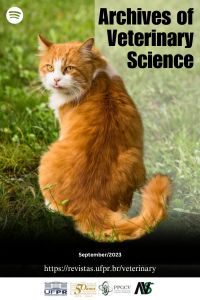The use of ascorbic acid in ovo feeding for poultry embryos and its effect on egg hatchability, embryo mortality, chicks’ weight, and gastrointestinal tract development
DOI:
https://doi.org/10.5380/avs.v28i3.85499Palavras-chave:
ascorbic acid, biotechnology, hatchability, in ovo, vitamin CResumo
Ascorbic acid, also known as vitamin C, is essential for the development of eggs and chicks due to its various important roles in biological processes such as collagen synthesis, antioxidant activity, iron absorption, immune system support, neurological development and enzyme cofactor. The injection of nutrients in ovo is a valuable technique used in poultry production due to the possibility of early nutrient delivery to chick embryos and improvement of this development. Front this, this study aimed to evaluate the effects of ascorbic acid use to in ovo feeding for poultry embryos. A total of 350 Rhode Island Red fertile eggs with viable embryos were randomly distributed in seven treatments with 50 replicates (eggs) each. The treatments were control (untreated eggs), eggs subjected to a saline solution (0.50% NaCl) and solutions containing increased levels of ascorbic acid (0.25, 0.50, 0.75, 1.00, and 1.25%). Evaluation of hatchability, embryo mortality, chicks’ weight, and gastrointestinal tract development were performed. The increased addition of ascorbic acid in solutions to in ovo feeding caused a linear decrease (P≤0.05) on hatchability, a linear increase (P≤0.05) on intermediary embryo mortality. It was also observed a linear decrease (P≤0.05) in late embryo mortality. In ovo injection of solutions with 0.50% of ascorbic acid provided heavier (P≤0.05) chicks at birth with better (P≤0.05) gizzard development. However, in ovo injection of ascorbic acid did not affect (P>0.05) the general development of the gastrointestinal tract. In conclusion, in ovo injection of ascorbic acid affected hatching characteristics. Increasing levels of ascorbic acid resulted in a linear decrease on hatchability and a sudden increase in intermediary embryo mortality. In ovo injection of solutions with 0.50% of ascorbic acid provided heavier chicks at birth with better gizzard development. However, it did not affect the development of the gastrointestinal tract of chicks with 1 day-old.
Downloads
Publicado
Como Citar
Edição
Seção
Licença
Autores que publicam nesta revista concordam com os seguintes termos:
- Autores mantém os direitos autorais e concedem à revista o direito de primeira publicação, com o trabalho simultaneamente licenciado sob a Creative Commons - Atribuição 4.0 Internacional que permite o compartilhamento do trabalho com reconhecimento da autoria e publicação inicial nesta revista.
- Autores têm autorização para assumir contratos adicionais separadamente, para distribuição não-exclusiva da versão do trabalho publicada nesta revista (ex.: publicar em repositório institucional ou como capítulo de livro), com reconhecimento de autoria e publicação inicial nesta revista.
- Autores têm permissão e são estimulados a publicar e distribuir seu trabalho online (ex.: em repositórios institucionais ou na sua página pessoal) a qualquer ponto antes ou durante o processo editorial, já que isso pode gerar alterações produtivas, bem como aumentar o impacto e a citação do trabalho publicado.














